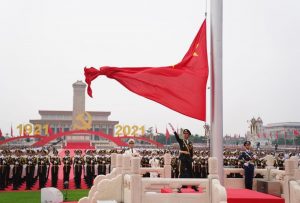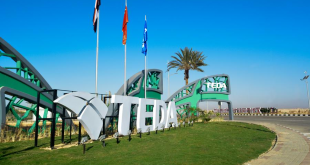Published: January 29,2022
By Peter Kagwanja

Africa was still reeling under the yoke of colonialism when the Chinese Communist Party (CPC) was officially founded on July 1, 1921. A hundred years later, modern China’s founding and governing political party still attracts modern Africa. CPC’s achievements and challenges carry seven enduring lessons for the continent and its people.
Foremost of these is that no country can be truly free and prosperous when its neighbours and sections of humanity are still under external occupation, oppression, exploitation and humiliation. China itself suffered a century of external occupation and humiliation and exploitation between 1840 and 1949. Thus, upon coming to power on October 1, 1949, under its indomitable leader Mao Zedong, the CPC supported Africa’s struggle against colonialism, providing resources, military assistance, and expertise.
Secondly, we learn from the CPC that long-term regime stability is necessary for real freedom, democracy, and development. Over the last 72 years, the party has united China’s 56 ethnic nationalities, maintained its security, political stability, and defended its sovereignty. The CPC triumphed over the four mortal enemies of governing parties: dogmatic ideology, dormant party organization, fragmentation of the ruling elite, and economic stagnation. After 2012, under President Xi Jinping, the CPC has reformed its structure, ideology and leadership to confront the challenges of the 21st century. In his congratulatory message to the CPC leadership, South African President Cyril Ramaphosa rightly noted that Xi’s “Thought on Socialism with Chinese Characteristics for a New Era”, now enshrined into the Constitution, “is an important contribution to the world.”
The third lesson is that peaceful development is the real foundation of democratic freedom and prosperity. A peaceful environment has enabled China’s rapid economic growth and steady rise to become the richest and fastest developing country on Earth. Since December 1978, the party’s reforms and opening up has transformed China into the second-largest economy in the world, with a total GDP of $15.66 trillion in 2020. The CPC’s 14th Five Year Plan (FYP, 2021-2025) has provided China with the necessary framework to confront the challenges of Sino-US tensions, the global coronavirus pandemic, and de-globalization.
Fourthly, a strong political party is necessary to win the war against poverty. The CPC is on the verge of winning the century-long struggle to wipe out absolute poverty. Since its “Reforms and Opening Up” initiated under Deng Xiaoping after 1978, China has lifted over 850 million people out of poverty, which the World Bank hailed as “one of the great stories in human history.” In extending his congratulations to General Secretary Xi Jinping and the Chinese people, Kenyan President Uhuru Kenyatta praised China for becoming the first country to meet “the poverty eradication target set in the UN 2030 Agenda for Sustainable Development 10 years ahead of schedule”. At the end of 2020, China announced that it had managed to eradicate extreme poverty, becoming the first country in history to achieve this feat.
The fifth lesson is that systemic corruption is a threat to economic development, poverty eradication, political and social stability. CPC has prioritized fighting corruption and upholding integrity as the most important part of party building. Under Xi, the CPC pursues a zero-tolerance policy to corruption, catching both “tigers” (high ranking offenders) and “flies” (petty ones). The scope of Xi’s campaign has been unprecedented, targeting over two million officials. However, anti-corruption is still a work in progress.
Sixth, realizing sustainable development requires a strategy to balance the imperatives of development and conservation of the natural environment. In 2012, the CPC adopted the concept of ‘Ecological Civilization’ (shentai wenming) to drive China’s transition to high quality (green) development for the “New Era”. As a result, China is targeting peak carbon dioxide emissions by 2030 and carbon neutrality before 2060.
The final lesson is that strategic bonds of solidarity across peoples and civilizations are the surest pathway to realizing humanity’s common dream of achieving durable peace and shared prosperity. In recent decades, CPC has renewed historic ties between China and Africa, weaved around the Forum for China Africa Cooperation (FOCAC), created in 2000. FOCAC has become part of the story of “Africa Rising” from “a hopeless continent” to the frontier of fastest growth, claiming the 21st century. Between 2000 and 2018, China channelled approximately $206 billion towards Africa’s development. Undoubtedly, this is the largest financial bailout in history. Moreover, Africa’s 44 countries out of 55 states, along with the African Union are among 140 countries and 31 International Organizations participating in China’s massive Belt and Road Initiative (BRI). China’s annual trade with BRI countries already exceeds $1.4 trillion. The Initiative covers 65% of the world’s population, three-quarters of global energy resources, and 40% of GDP.
Deng Xiaoping once quipped, “if you open the window for fresh air, you have to expect some mosquitoes to blow in.” In its next centenary, the CPC has to address the challenges of the growing inequality gap and massive income disparity internally. It also must confront the resurgent Cold War-era geopolitical rivalry and tensions with America alongside the impact of coronavirus and future epidemics. The CPC must lead in the remaking of the post-COVID 19 World Order.
Professor Peter Kagwanja is President and Chief Executive of the Africa Policy Institute, Adjunct Professor at the University of Nairobi, and Adviser to the Government of Kenya and the Inter-Governmental Authority on Development (IGAD).
cgtn.com
 Africa -China Review Africa -China Cooperation and Transformation
Africa -China Review Africa -China Cooperation and Transformation
